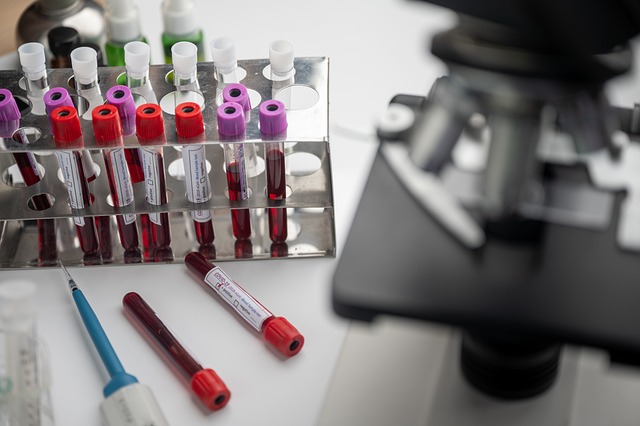Vitamin deficiencies, impacting overall well-being through specific bodily functions, require early identification via simple blood tests. These tests, measuring levels like Vitamin D and B12, enable non-invasive screening and prompt corrective actions. At-home kits or laboratory services have simplified access to these tests, revolutionizing healthcare with better patient outcomes. Interpreting results, indicating potential health issues, is key, leading to dietary changes or medical treatments. Regular follow-ups ensure treatment effectiveness, emphasizing proactive healthcare management through early vitamin deficiency detection.
In today’s digital age, easy access to health diagnostics is paramount. Among these, blood tests for vitamin deficiencies play a crucial role in identifying subtle yet significant imbalances that can impact overall well-being. This article delves into the importance of such tests, explaining how they help diagnose and manage vitamin deficiencies. We explore simplifying access to these tests, interpreting results, and the benefits of widespread adoption, empowering individuals to take charge of their health.
- Understanding Vitamin Deficiencies and Their Impact
- The Role of Blood Tests in Diagnosis
- Simplifying the Process: Easy Access to Testing
- Interpreting Results and Next Steps
- Benefits and Considerations for Widespread Adoption
Understanding Vitamin Deficiencies and Their Impact
Vitamin deficiencies are common health issues that can have significant impacts on overall well-being. These deficiencies occur when the body lacks sufficient amounts of essential vitamins, which play crucial roles in various bodily functions. Each vitamin has specific responsibilities; for instance, Vitamin D is vital for bone health and immune system support, while Vitamin B12 contributes to nerve function and red blood cell formation.
When left undiagnosed and untreated, vitamin deficiencies can lead to a range of health complications. Anemia, caused by iron or Vitamin B12 deficiency, can result in fatigue and weakness. Deficiencies in vitamins A, C, and E may weaken the immune system, making individuals more susceptible to infections. Early identification is key; a simple blood test for vitamin deficiency can reveal these hidden issues, allowing for prompt correction through lifestyle changes, dietary adjustments, or targeted supplementation.
The Role of Blood Tests in Diagnosis
Blood tests play a pivotal role in diagnosing vitamin deficiencies, offering a straightforward and effective method to assess an individual’s nutritional status. These tests provide valuable insights into the presence and severity of specific vitamin deficiencies by measuring the levels of various vitamins in the bloodstream. By analyzing samples taken from veins, healthcare professionals can identify low levels of essential vitamins like B12, D, or folate, which are crucial for optimal health.
The convenience of blood tests for vitamin deficiency diagnosis is significant, as they offer a quick and non-invasive way to gather critical health information. This accessibility enables early detection, allowing individuals to take prompt corrective actions, such as dietary adjustments, supplementation, or targeted medical treatments. As a result, regular screening through blood tests can empower people to manage their health effectively and prevent the potential long-term complications associated with untreated vitamin deficiencies.
Simplifying the Process: Easy Access to Testing
Simplifying the process of diagnosing vitamin deficiencies through easy access to blood testing is a significant step forward in healthcare. In the past, getting a blood test for vitamin deficiency could be a cumbersome task, involving multiple appointments and lengthy procedures. However, advancements in medical technology and increasing awareness have made this process more convenient. Now, patients can conveniently access these tests with minimal effort, allowing for early detection and prompt treatment.
The availability of simple, at-home testing kits or quick laboratory services ensures that individuals can readily assess their vitamin levels. This accessibility is particularly beneficial for those who might overlook subtle symptoms or face barriers to traditional medical care. By streamlining the process, healthcare professionals can identify deficiencies more effectively, leading to better patient outcomes and a healthier population.
Interpreting Results and Next Steps
Interpreting blood test results for vitamin deficiencies is a crucial step in understanding your health. Elevated or low levels of specific vitamins can provide valuable insights into potential deficiencies. For instance, a lack of Vitamin B12 might indicate pernicious anemia, while Vitamin D deficiency could be linked to bone-related issues. It’s essential to discuss these findings with a healthcare professional who can explain the implications and suggest appropriate actions.
The next steps typically involve addressing the identified deficiency through diet changes, supplements, or medical interventions. For example, increasing exposure to sunlight might be recommended for Vitamin D deficiencies, while fortified foods or injections could be prescribed for B12 deficiencies. Regular follow-up blood tests are often necessary to monitor progress and ensure the effectiveness of the chosen treatment plan.
Benefits and Considerations for Widespread Adoption
The widespread adoption of easy-access blood tests for vitamin deficiency diagnosis offers numerous benefits. It empowers individuals to proactively manage their health by providing early detection of potential deficiencies, allowing for timely interventions. This is particularly crucial as untreated vitamin deficiencies can lead to various health complications. With a simple blood test, healthcare becomes more accessible and less intimidating, encouraging folks to take charge of their well-being.
However, several considerations must be addressed. Cost-effectiveness and insurance coverage play significant roles in making these tests readily available. Ensuring affordability ensures that financial barriers don’t discourage individuals from seeking necessary testing. Additionally, educational campaigns are essential to raise awareness about the importance of vitamin deficiencies and how easy access to testing can positively impact public health.
Blood tests for vitamin deficiency diagnosis have become more accessible, simplifying the process for both healthcare professionals and patients. This easy access is a game-changer in detecting and managing these common yet often overlooked deficiencies. By utilizing this straightforward tool, we can empower folks to take charge of their health and ensure they receive appropriate treatment promptly. Widespread adoption of such practices could lead to significant improvements in overall well-being, highlighting the importance of simple, effective solutions in modern healthcare.
